When you think of crypto exchanges, names like Binance and Coinbase quickly come to mind. However, there is a difference between centralised and decentralised exchanges. DEXs came about with the advent of decentralised finance. Today, crypto holders interested in joining the bandwagon of DeFi users can choose from the top decentralised crypto exchanges around. Are you one of them?
Although the blockchain is decentralised, regulatory bodies and intermediaries still help crypto holders manage their wallets and digital assets. These middlemen and regulatory bodies constitute the centralised aspect of crypto. There are advantages to these third parties, like ease and higher trading volume. However, there is also an increased risk of hacking, theft and even exchange crashes. With decentralised exchanges, some of these cons are mitigated.
So today, we’ll unravel DEXs, their benefits, how to set up a secure account on any of them and most importantly, 15 of the best-decentralised crypto exchanges available in 2023. Shall we begin?
What are Decentralised Crypto Exchanges (DEXs)?
Decentralised crypto exchanges or DEXs are third-party financial institutions allowing users to manage their wallets and carry out peer-to-peer transactions without regulations or help from a central body, broker or middleman. They are part of the burgeoning DeFi network.
DEXs operate in specific ways that are different from CEXs. There are no middlemen to help crypto owners send, receive or trade crypto. These transactions are done solely by the user. While CEX offers a marketplace that enables crypto holders to find buyers or sellers of assets easily, DEXs use smart contracts, reducing transaction costs.
A simple way to look at decentralised crypto exchanges is that they leverage the shortcoming of centralised exchanges. But it doesn’t mean they’re perfect, either. An example of this imperfection is the complexity of DEXs – don’t even bother using a decentralised exchange if you’re starting. Examples of decentralised crypto exchanges include Uniswap, Curve, and Sushiswap.
Read more: Top 5 Smart Contract Platforms.
What is The Difference Between Centralised And Decentralised Crypto Exchanges?
Centralised crypto exchanges (CEXs) are simply middlemen in the crypto market. They mediate between buyers and sellers who trade crypto and charge little transaction commissions and fees. They can do this because they have custody of the digital wallets of their customers. That’s why they’re referred to as custodial exchanges.
Fundamentally, the difference between decentralised cryptocurrency and centralised exchanges is in the custody of users’ digital wallets. The other differences are summarised in the table below.
Centralised Exchanges (CEXs) | Decentralised Crypto Exchanges (DEXs) | |
| Custody of assets | The exchange has custody of users’ wallets and, by extension, their assets. Management and trades are done by exchange for the user. | Crypto holders have custody of their wallets and their assets. Management and trades are done by the user. |
| Security | Assets are safe because the exchange is responsible for keeping your passwords safe. Passwords can be easily retrieved if a user forgets them. CEXs are more prone to hacks. | Assets are relatively safe. If a user is tricked, they cannot retrieve their assets. Passwords are also not retrievable if lost. Therefore assets can be lost through carelessness. DEXs are less prone to hacks. |
| Asset diversity | Lesser diversity due to security regulations. Assets listed in CEXs must be verified, secure and in demand. | Higher diversity, with the absence of regulations on security and demand for assets, Comes with the risk of acquiring useless assets. |
| Liquidity | Crypto holders can easily liquefy their assets due to high trading volume. | There’s no access to fiat money. Hence, liquidity is very low. |
| Transaction speed | Faster transactions due to a larger market/population. | Lesser speed on transactions. |
| Transaction fees | Higher transaction fees plus commission. | Lesser fees on transactions as they’re done on a peer-to-peer basis. |
| Regulation | Assets are more regulated as well as transactions | Lesser regulations lead to higher risk. |
| Ease of use | Easier for beginners to use since the exchange does most of the work. | More complicated. Better suited for more experienced crypto users. |
| Examples | Coinbase, Binance, Kraken | Curve, Sushiswap, Uniswap |
Advantages of Decentralised Crypto Exchanges
If you’re still learning crypto, you’ll struggle to understand the fuss about decentralised exchanges. Centralised exchanges are easy to use. Take out the exorbitant trading fees, and it’s probably the most convenient way to manage your digital assets, right? Perhaps. But DEXs have their appeal. So what are the benefits of using decentralised crypto exchanges?
- Privacy
- Better security
- Financial inclusion
1. Privacy
With how companies handle their clients’ data, many people are wary of anything requiring them to submit their data. That’s the beauty and appeal of a decentralised crypto exchange. You have privacy in your asset ownership and transactions. Unlike centralised exchanges, there’s no mandatory KYC (Know-your-customer) protocol). All you need to do to use a DEX is have a wallet address, passwords & access keys.
2. Better Security
Assets are safer on decentralised exchanges because hacking or theft is less likely. Users have custody of their wallets and are responsible for their digital tokens.
3. Financial Inclusion
The regulations imposed on users and assets in centralised exchanges make it difficult for people in certain regions to use cryptocurrency. You can see this playing out in the restrictions set by Binance on US crypto users. They’re not allowed to use the platform. In certain other cases, some assets are not made available to users of a particular region.
But with decentralised crypto exchanges, these rules do not apply because your location as a user is not known to the exchange or any other person.
What Are Other Types of Cryptocurrency Exchanges?
Primarily, there are two – centralised exchanges CEXs and decentralised exchanges DEXs. However, there is another type called a hybrid exchange (HEX). This type aims to combine the good features of CEXs and DEXs as well as tackle the shortcomings of both. One of the primary goals of hybrid exchanges is to deal with the problem of exorbitant trading fees in DEXs.
Take a look at a brief comparison of all three types of crypto exchanges.
| CEXs | DEXs | HEXs | |
| Ease of use | Easy to use. | Complex. | Easy to use. |
| Security | More prone to hacks due to the centralisation of assets. | Less prone to hacks. | Less prone to hacks due to decentralisation. |
| Speed | Faster transactions than seen in DEXs and HEXs. | Slower than CEXs. | Yet to be determined. But it seems to be faster than DEXs. |
| Custody | The exchange manages wallets and keys. | The owner manages wallets and keys. | Owners manage wallets and keys. |
| Privacy | KYC applies. Therefore, no privacy. | No KYC; more private. | No KYC; more private. |
| Examples | Coinbase | Pancakeswap | Qurrex |
15 Best Decentralised Crypto Exchanges (DEXs)
We have listed 15 of the best-decentralised crypto exchanges in no particular order. Before we get into it, you might see terms like ‘aggregator’.
Note📌: A DEX that identifies as an aggregator runs checks across several other DEXs to analyse the prices of tokens and provide its users with the best trade prices across multiple blockchains or the one it deals in.
Now, go on and take a look at the list.
- Kyberswap
- Uniswap
- Sushiswap
- dYdX
- Dexguru
- Bancor
- Cowswap
- Curve
- Dodo
- Paraswap
- OpenOcean
- Bisq
- Saber
- Balancer
- IDEX
1. Kyberswap
Kyberswap is a decentralised crypto exchange that operates on 12 blockchain networks, including Solana, Ethereum, Polygon and Cronos. It analyses these networks and provides its users with the best token prices. Hence, you can refer to it as an aggregator DEX. Major benefits are its support of multiple networks and the aggregate analysis to facilitate profitable trades for its users.
2. Uniswap
Uniswap is one of the best-decentralised crypto exchanges you’ll find. It uses the Automated Market Maker system of operation. This means it provides liquidity for crypto traders using its platform and ensures fairness in determining the highest and lowest sell offers. Uniswap supports the Ethereum and polygon networks. You can swap tokens, buy and sell NFTs and even buy crypto with your credit card.
3. Sushiswap
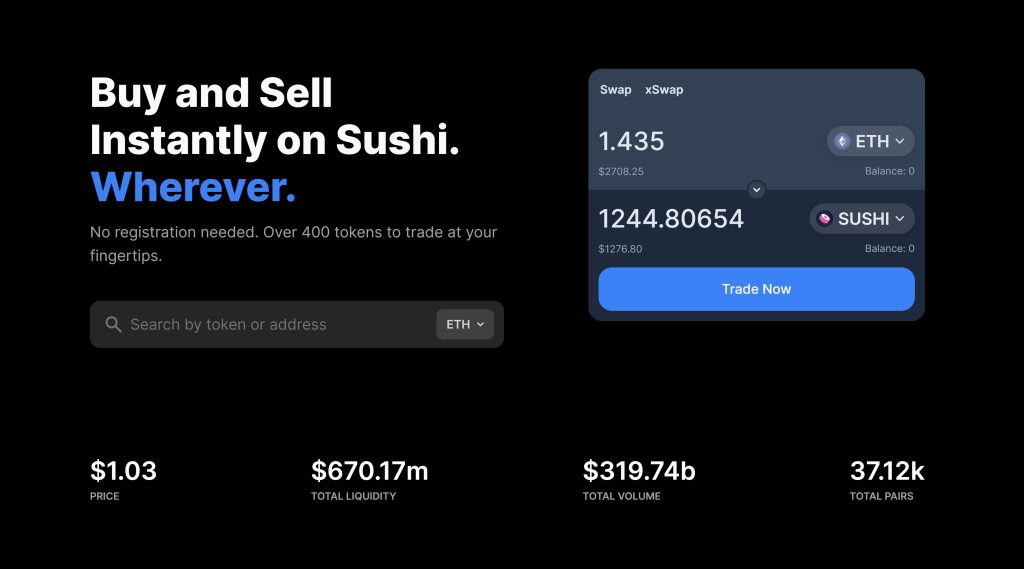
Sushiswap is another DEX focused on providing liquidity to its users. It is an Ethereum-based platform that allows users to swap ERC20 tokens via liquidity pools. It also utilises the AMM system to reduce market manipulation. Among the services this decentralised exchange provides are a lending market, a yield farm and trading. In all, it is relatively easy to use and suitable for beginners.
4. dYdX
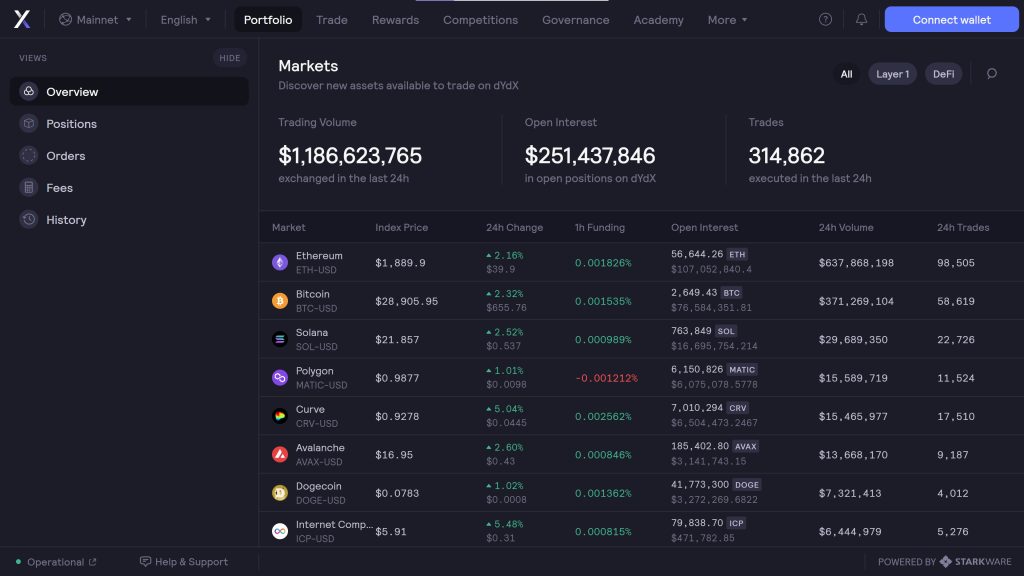
This is another open-source exchange. dYdX allows crypto users to carry out decentralised margin trades to minimise losses. It’s a platform for seasoned crypto traders looking for a decentralised market. But one drawback is that it only supports the Ethereum blockchain.
5. Dexguru
If you’re looking for better trading opportunities and the tools that enable you to trade in a decentralised setting, Dexguru is a good option. It’s a simple decentralised crypto exchange based on the Ethereum network. So you may have limitations on the assets you can buy or sell.
6. Bancor
Bancor – Another AMM decentralised crypto exchange built on the EOS and Ethereum networks. The DEX uses AMM smart contracts for trades. Although it only supports Ethereum and EOS blockchains, its AMM smart contract protocols allow you to integrate it with other exchanges using the same protocol to facilitate liquidity across multiple chains. Bancor has its token known as BNT. The token acts as a buffer against which other smart contract assets are traded.
7. Cowswap
This DEX is also an Ethereum-based protocol enabling gas-less peer-to-peer user trading. This means that Cowswap operates on a demand-meets-supply basis and vice versa. If there is a supply or demand for a token and the corresponding demand or supply is unavailable, the DEX’s AMM protocol handles it. Cowswap also supports trades across other exchanges and aggregators as long as the tokens are on-chain.
8. Curve
Curve is quite straightforward in its offerings. It uses AMM protocol to create liquidity pools for assets that are very similar, for example, stablecoins. This way, there’s less slippage (a term that describes the high cost of a transaction). The DEX is built on the Ethereum blockchain. This means it may not allow you access to other off-chain tokens for trading.
9. Dodo
Dodo is another decentralised crypto exchange that uses Proactive Market Maker (PMM), an offshoot of the AMM protocol. PMM mimics the settings of a human-made market with all the accompanying conditions. It is an aggregator DEX and is focused on reducing slippage as well as impermanent loss.
Note📌: Impermanent loss is a situation in crypto where your profit from pooling your token in a liquidity pool is less than the token’s value when you first deposited it.
10. Paraswap
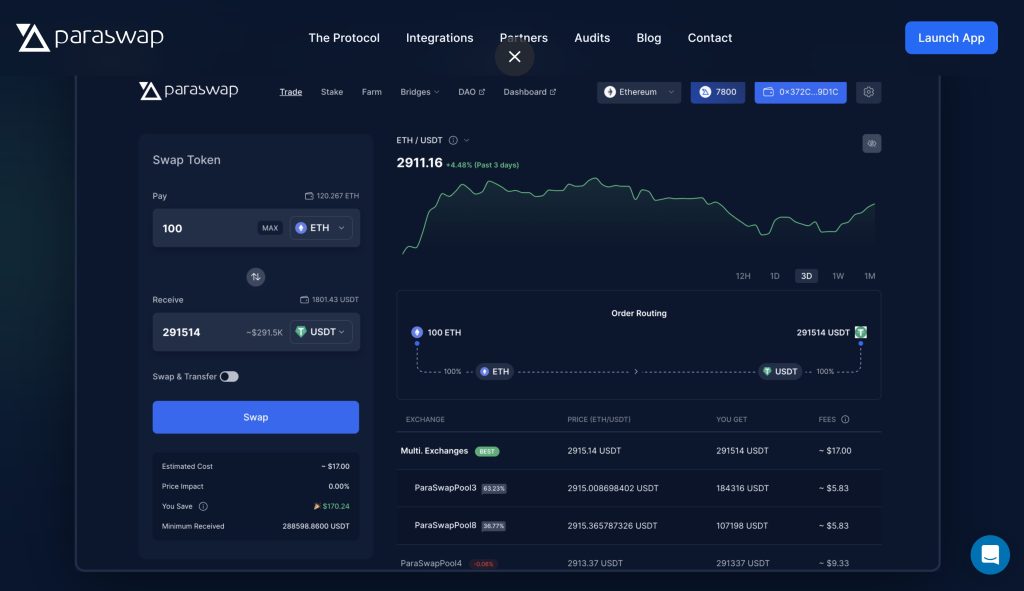
Here, we have another decentralised exchange aggregator. Paraswap analyses token prices across various DEXs and allows for liquidity pooling across those DEXs to reduce slippage and lower gas fees as much as possible. It operates on the Ethereum and EVM networks.
11. OpenOcean
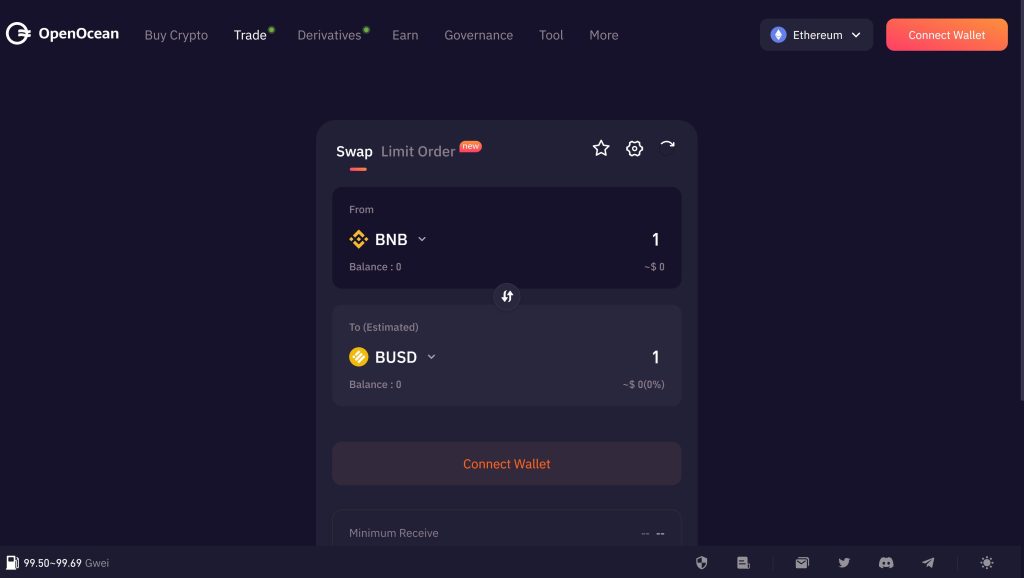
OpenOcean is reputed to be a leading DEX aggregator that allows its users to swap tokens across multiple blockchains. It’s a more trade-centric platform, offering liquidity across different networks to reduce gas fees and get the best token prices. It also comes with a suite of Web3 development tools. It’s suitable for crypto mavens interested in maximising trading opportunities across multiple networks.
12. Bisq
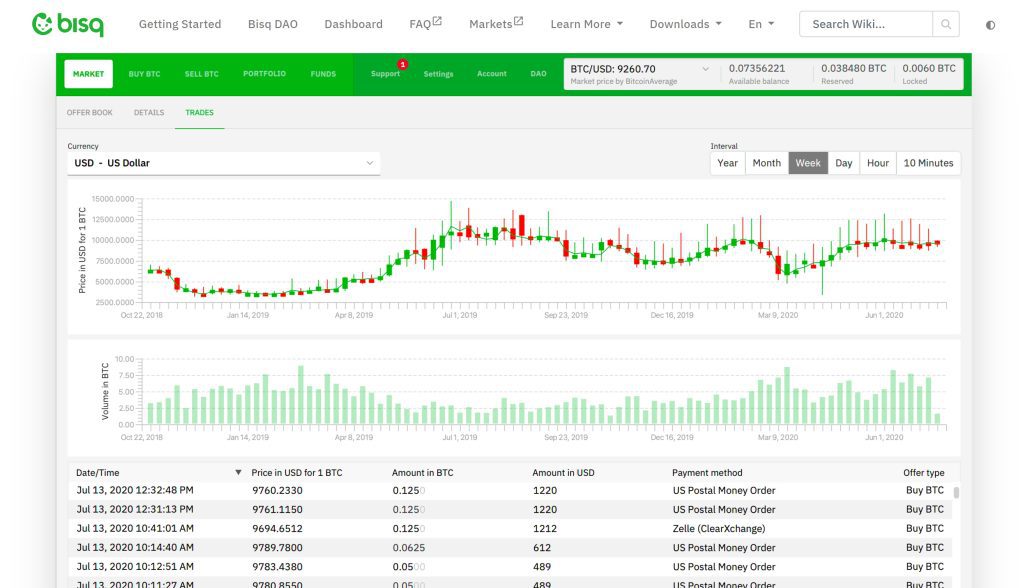
Bisq is one of the few DEXs that operate on the Bitcoin chain. However, it allows trades off the Bitcoin blockchain and even for token-fiat or fiat-token trades! Bisq is a simple open-source Peer-to-peer platform that is versatile for those who want a decentralised exchange that allows complete liquidity, fiat currency included.
13. Saber
With its focus solely on stablecoin and wrapped token pairs, Saber stands out as one of the decentralised exchanges on the Solana blockchain. It also utilises the AMM protocol and is a wise choice for crypto holders who want to trade stablecoins in a decentralised setting.
14. Balancer
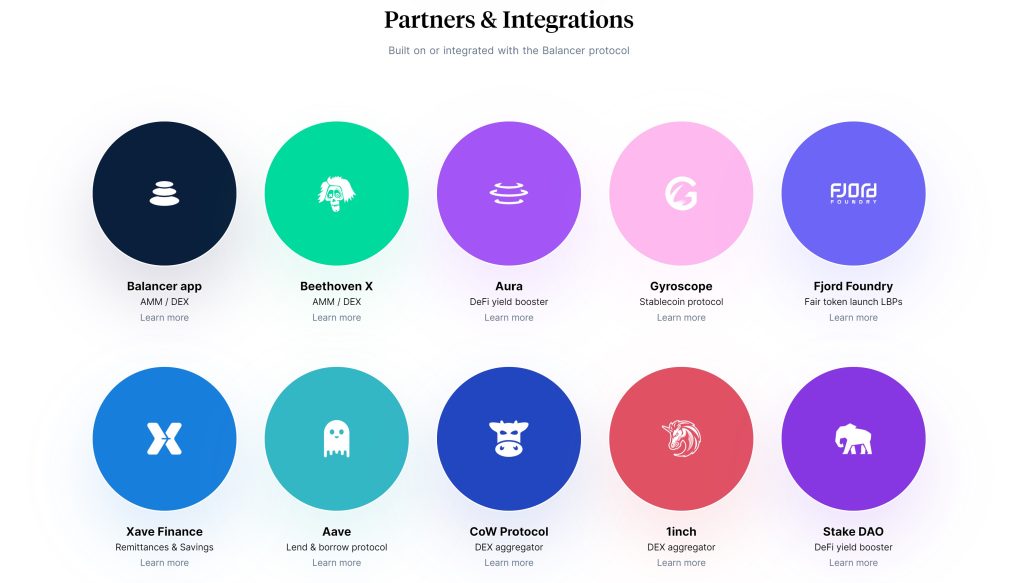
Like Uniswap and Sushiswap, Balancer is a DEX built with the AMM protocol. Its unique feature allows liquidity providers to add up to eight tokens per liquidity pool. The implication is a portfolio-like liquidity pool. Its drawback is that it only supports ERC20 tokens.
15. IDEX
One very unique thing about IDEX is that it operates on both the AMM and order book systems. Other crypto connoisseurs refer to it as a hybrid liquidity decentralised exchange. This hybrid system makes it faster in trading than other DEXs. One drawback is that IDEX introduced KYC. But users can still connect to it as a dApp while keeping custody of their wallets if they choose not to comply with the KYC requirement.
How to Choose the Best Decentralised Crypto Exchange For You
If you’ve read about decentralised crypto wallets and are looking for a good DEX to start your DeFi journey, what factors should you look out for? How do you know which decentralised crypto exchange to use? You need to know the boxes a DEX must have before you use it because choosing blindly will only confuse you and may even lead you to costly mistakes.
It’s easy. Consider the following factors.
- Blockchain support
- Ease of Use
- Versatility
- Reviews
1. Blockchain Support
Although many decentralised crypto exchanges allow users to access liquidity pools or trade across multiple blockchains, many others still restrict transactions to tokens within a particular network. So before you use a specific DEX, check the blockchains it supports. Some DEXs, like OpenOcean, support multi-chain trading. It all comes down to the tokens you’re interested in or already have in your wallet.
2. Ease of Use
Some DEXs are better suited for DeFi newbies, and others are great for the OGs in the crypto game. It may seem unappealing, but the fewer the features, the easier it is for beginners because there will be lesser confusion. Examples of the simpler DEXs are Saber, Bisq and Curve. However, if you’re an oldie and you know your way around the DeFi maze, by all means, hop on the more sophisticated DEXs like dYdX, Balancer or Dodo.
3. Versatility
Except you’re just learning the ropes, you would be better off going with a versatile decentralised exchange. Versatility refers to different features or the freedom to carry out multiple functions. Some functions include swapping tokens across multiple chains, liquidity pooling, running aggregates, etc. The more, the merrier, right?
4. Reviews
What are people saying about these exchanges? What is the public opinion on an exchange’s features, new releases, updates, etc? Apart from the DEX’s website page, read reviews of anyone you’re interested in. Join Reddit forums and ask about other users’ experiences. Experience is the best teacher when it’s another person’s – at least, in this case.
How To Use a Decentralised Crypto Exchange
After you’ve done your due diligence (and you must do) and picked a DEX to use, here’s how to get started on it. Follow this step-by-step guide to get started on any decentralised exchange.
- Pick an exchange after doing your due diligence.
- Open your browser and enter the name of the exchange with ‘DEX’ at the end—for example, Curve dex. The first website on the results page would be the exchange’s website. You can do this on your desktop or mobile via Windows, Linux or iOS.
- Open the website and click on Connect Wallet, often found on the top right corner of your screen if you’re using a desktop. Select the wallet you use and connect it.
Note that some wallets require you to download a dApp for the connection. Others, like Brave, may even require a specific browser.
- After connecting your wallet, check your dashboard to see your tokens and the actions you can take on them.
The display on your screen might be a little overwhelming at first, but you’ll quickly get used to it, except you’re a complete rookie with no idea about decentralised wallets or exchanges.
How To Keep Your DEX Account Safe
Yes, security is one of the top features and benefits of DeFi and decentralised crypto exchanges. So why do you need to keep your account safe? Because anyone who can access your account can access your wallet if it’s connected and, by extension, your assets! So the right question should be, how do I secure my DX account? Easy. Do the following.
1. Ensure You Use The Right Website.
It’s a no-brainer, right? Well, many phishing sites pose as legit sites, and you can identify a phishing website by checking if the connection is secure and if your browser gives the URL a green tick. Phishing sites are notorious for stealing sensitive information from internet users, passwords included. So, be on the lookout.
2. Use a Unique Password.
When creating your account, ensure your password contains letters, numbers and special characters because that’s the best way to create a strong password. But if the password is to be a seed phrase, use unique combinations that no one can guess. Write it down somewhere safe too. Don’t save it on your Google account.
3. Password Protect Your dApps
Ensure your decentralised apps are protected whether you access them through your browser or apps on your mobile phone. Use your biometrics anywhere possible to encrypt the apps.
With all these measures in place, you don’t need to worry much about your DEX account. Security is a winning point in decentralised finance, except you lose your private keys or seed phrases.
Final Word
Decentralised exchanges are growing in popularity, and rightly so. DeFi seems to be making significant progress in tackling the challenges of centralised finance. The top 15 best-decentralised crypto exchanges listed in this article are great options for their different features and benefits.
Choose one of the best DEXs today and enjoy the security, privacy and transparency the platforms offer.
Disclaimer 📢: Prestmit is not responsible for any choices made by readers or users. Kindly do your due diligence before engaging with any platform.

